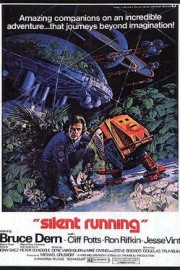Silent Running
We come to different movies for different reasons. You would think that it was the fact that Douglas Trumbull did the visual effects for “2001: A Space Odyssey” that would have led me to this science fiction drama, but in fact, it wasn’t a serious exploration of the cosmos, but a comedic exploration of cinema, that did that. Joel Hodgson has always been up front with how his character, Joel, and his robot pals on “Mystery Science Theater 3000” were inspired by “Silent Running,” and indeed, when I first watched the film, one can make the easy parallels. “Silent Running” isn’t just a movie that inspired a pop culture icon, however; it’s an interesting character study exploring the mindset of a man who cares about life, and wants to preserve it at all cost. That he happens to be in space while doing so is simply how Trumbull and his writers chose to tell this story.
On Earth, the environment is destroyed. No forests, no trees, no flowers; everything that remains is preserved on a fleet of greenhouses in space. Helping do that is Freeman Lowell (Bruce Dern), a botanist on the Valley Forge, and he takes his work seriously, especially when his fellow crew (Cliff Potts, Ron Rifkin and Jesse Vint) are goofing off, and racing the buggies they have on board. One day, they get word- destroy the remaining specimens. Lowell is unable to let them go, so he tries to take off into the vastness of space, around Saturn, to maintain the life he has helped save.
The screenplay by Deric Washburn, Michael Cimino and Steven Bochco (and yes, those last two are the director of “Heaven’s Gate” and creator of “NYPD Blue,” respectively) does a good job of getting us inside Lowell’s character, and what drives him to do what he does, but it doesn’t do a lot of heavy lifting to explain why the specimens he’s been maintaining need destroyed. Yes, they are going to be using the transports for commercial purposes, but why- all of the sudden- is reforestation of Earth not a priority? We can make inferences, and the film’s theme is fairly direct- mankind sees Earth only for its resources, not as a land to preserve- but the narrative is thin. That’s not inherently a misstep, especially since the main character’s motivations are crystal clear, and he’s largely on his own throughout the film, but it prevents “Silent Running” from being a deeper experience than it is. That doesn’t make it any less prescient in how large swaths of humanity view the environment solely in how it benefits the bottom line, rather than how we should take care of it. That makes the film every bit as relevant to modern times than it was in 1972.
This is one of those films where the music feels almost diametrically opposed to what the film is, but feels very authentic to where the film’s heart lies. This is ultimately a film about a hippie going up against the establishment, and that ’60s anti-establishment mentality is perfectly representative in the score by Peter Schickele (who might be better known by his satirical name, P.D.Q. Bach), and the songs sung by Joan Baez. You would think, in the early ’70s, this movie would have gone with a synthesized score to make it more evocative and somber, but what makes Schickele’s choices here so interesting is that he’s bouncing off of the symphonic ideas of “2001,” and fusing it with a more pop sensibility that was likely intended to draw in mainstream audiences of the ’70s. It makes for a weird collision of ideas, but when it matters, this film knows its a counter culture parable told in space, and the emotions of some of the themes- and especially the songs- play to that beautifully.
Because the film is more of a cult item, it’s place in the history of visual effects in movies might get lost, but watching it for the first time in probably 20+ years, I find myself immersed in the visual landscape Trumbull and his collaborators create. Yes, there are times when he is very much just lifting from Kubrick and “2001”- and one scene in particular was originally conceived for “2001,” but was repurposed here- but you can look at this film, the interiors of the ships, and the drones that Lowell rewires for his own use, and you can see what we’ll get in a few years in “Star Wars” and “Alien,” among countless other films to come, even a TV series about a man and two robots who riff on bad movies. At the center of the film- at its heart- is Dern, giving a performance of great empathy in a role that could easily be unbearably preachy, but- in the actor’s hands- is a masterclass in how to make an earnest and sincere character engaging, and someone we want to follow through to the film’s conclusion, which is filled with bleak images, but also hope in how- if we teach the next generation of stewards right- maybe Earth can survive. I wonder if we’re too late, though.










